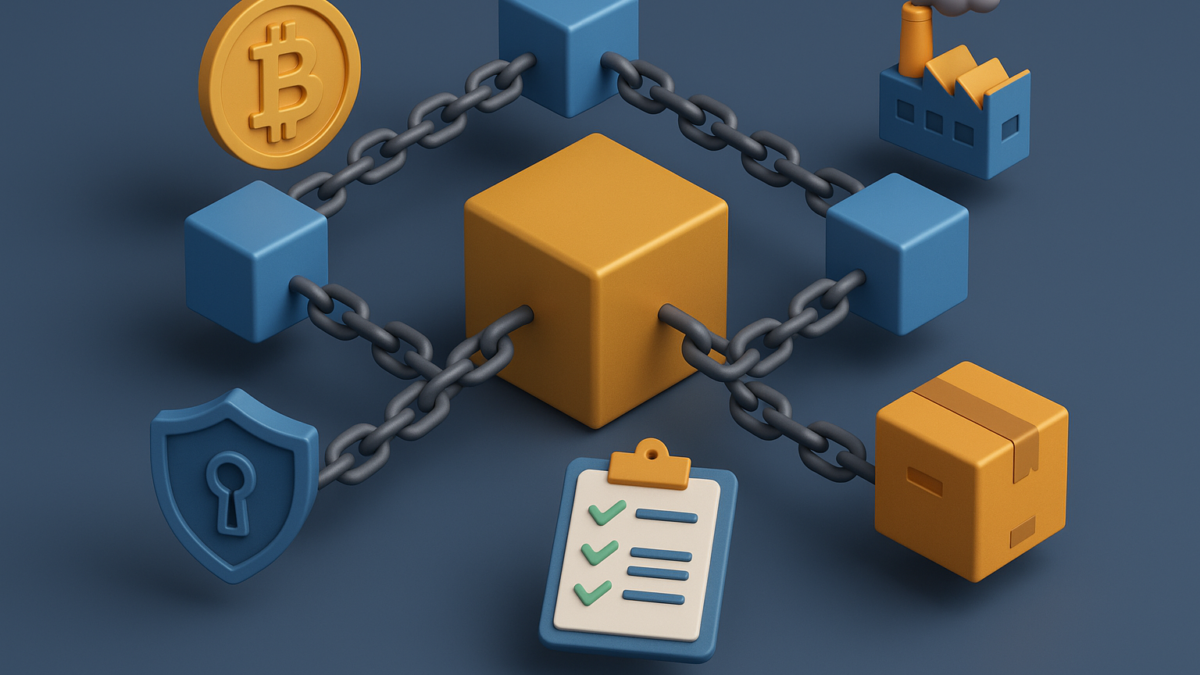Blockchain Beyond Bitcoin: Real-World Use Cases Changing Industries Today
Table of Contents
When people hear “blockchain,” the first thought that often comes to mind is Bitcoin. While blockchain technology was initially designed as the backbone of cryptocurrency, it has since evolved into something much bigger. Today, businesses across industries are leveraging blockchain for transparency, security, and efficiency. From healthcare and supply chain management to real estate and entertainment, blockchain is proving its worth far beyond digital currencies.
In this blog, we’ll explore real-world blockchain use cases, their benefits, and how industries are reshaping operations with this disruptive technology.
What is Blockchain Technology?
At its core, blockchain is a decentralized digital ledger that records transactions across multiple computers. Unlike traditional systems, it cannot be altered or tampered with easily, making it highly secure and transparent. Every “block” contains a record of transactions, and once verified, it gets linked to the chain—hence the name “blockchain.”
The true power of blockchain lies in its ability to remove intermediaries, reduce fraud, and establish trust between parties who may not even know each other.
Real-World Blockchain Use Cases
1. Supply Chain Transparency and Efficiency
Global supply chains are complex, involving multiple players such as manufacturers, distributors, and retailers. Mismanagement or fraud can cause huge financial and reputational damage.
Blockchain introduces end-to-end transparency. Every product movement can be tracked, verified, and recorded. Companies like Walmart and IBM are already using blockchain to trace food items from farms to shelves, ensuring safety and authenticity.
Key Benefits:
- Prevents counterfeiting
- Improves logistics efficiency
- Builds consumer trust through transparency
2. Healthcare Data Security
Patient data is often scattered across multiple healthcare providers, creating inefficiencies and risks of data breaches. Blockchain provides a secure and unified system for storing medical records, accessible only to authorized parties.
For example, blockchain can ensure that your health history follows you across different hospitals without compromising privacy.
Key Benefits:
- Enhanced patient data security
- Better interoperability among providers
- Reduced healthcare fraud
3. Real Estate Transactions
Property transactions typically involve lengthy paperwork, verification processes, and intermediaries. Blockchain simplifies this by offering smart contracts that automatically execute agreements when predefined conditions are met.
Countries like Sweden and Georgia have started experimenting with blockchain-based land registries, reducing fraud and speeding up transactions.
Key Benefits:
- Eliminates fraudulent property claims
- Faster property sales
- Lower transaction costs
4. Voting Systems
Elections are often plagued with concerns over fraud, mismanagement, and lack of transparency. Blockchain-based voting systems offer a tamper-proof solution where every vote is securely recorded and verifiable.
Estonia has already experimented with blockchain in digital governance, setting an example for other nations.
Key Benefits:
- Transparent and auditable elections
- Increased voter participation through digital systems
- Strong protection against manipulation
5. Finance Beyond Cryptocurrency
While Bitcoin started the blockchain revolution, financial institutions are exploring its applications beyond digital currencies. Decentralized Finance (DeFi) platforms allow lending, borrowing, and trading without banks. Additionally, cross-border payments using blockchain are faster, cheaper, and more secure compared to traditional systems like SWIFT.
Key Benefits:
- Faster international transactions
- Reduced fees for users
- Increased financial inclusion globally
6. Entertainment and Digital Rights Management
Musicians, artists, and creators often face challenges in protecting intellectual property and earning fair royalties. Blockchain helps creators secure ownership rights and ensures transparent royalty distribution.
Platforms like Audius are already using blockchain to empower musicians with direct ownership of their content.
Key Benefits:
- Eliminates middlemen
- Transparent payment tracking
- Stronger copyright protection
7. Energy Sector and Sustainability
Blockchain is driving peer-to-peer energy trading, allowing households with solar panels to sell excess energy directly to neighbors without relying on utility companies. Companies like Power Ledger are leading innovations in this field.
Key Benefits:
- Promotes renewable energy use
- Reduces dependency on central providers
- Encourages sustainability practices
The Future of Blockchain Across Industries
The blockchain market is projected to grow at a CAGR of over 60% by 2030, according to multiple reports. While challenges such as regulatory concerns, scalability, and energy consumption remain, the technology’s potential is undeniable.
As businesses continue experimenting, blockchain will become a foundation for trust, security, and decentralization across sectors. Just as the internet transformed communication, blockchain is set to transform transactions, governance, and ownership in the coming decade.
Final Thoughts
Blockchain is no longer just about Bitcoin. It is a game-changing technology with applications ranging from healthcare and real estate to finance and entertainment. Organizations adopting blockchain today are gaining a competitive edge through transparency, security, and operational efficiency.
As industries continue to innovate, blockchain will redefine how we exchange value, protect data, and build trust in a digital-first world.
You May Also Like: Beyond Downloads: Measuring the True ROI of Whitepapers in 2025





